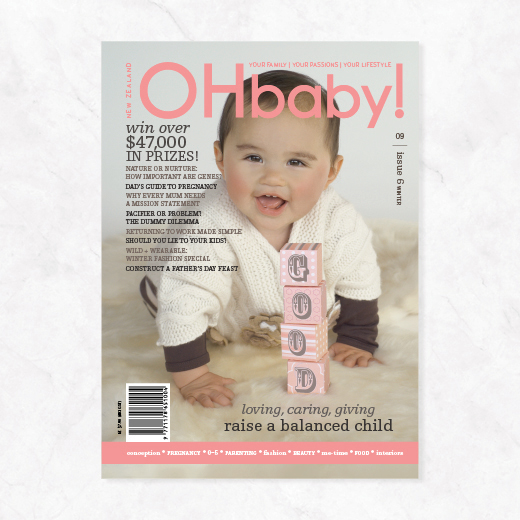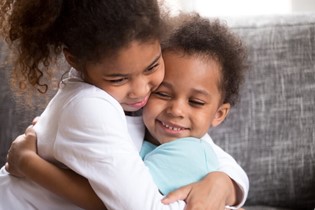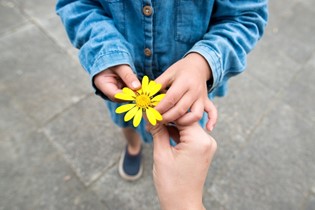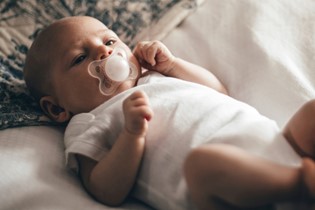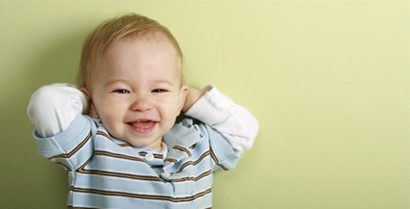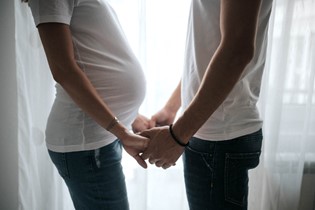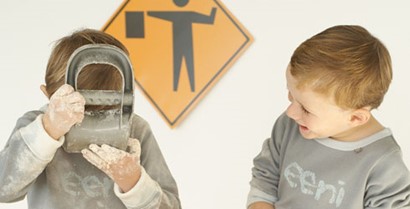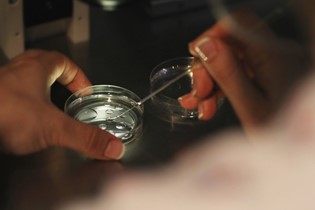Egg and sperm donation: the ethics
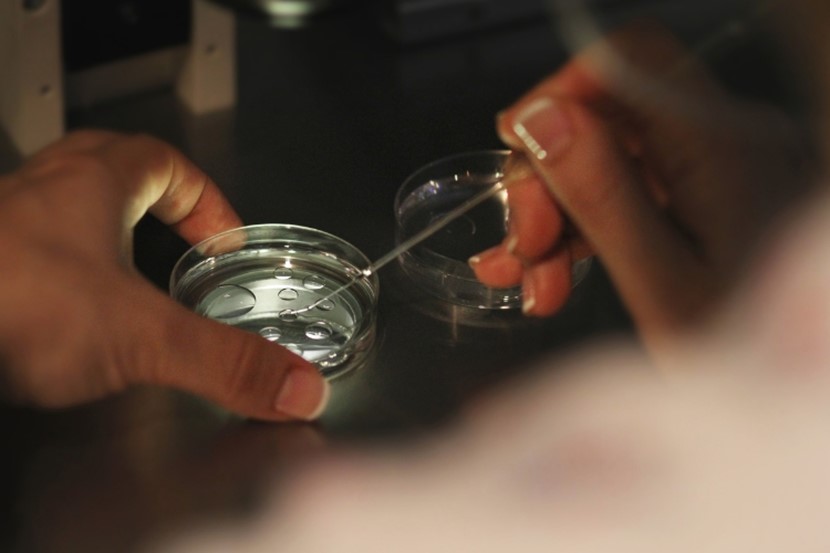
In the world of assisted reproduction, nothing is black-and-white. Fertility specialist Dr Richard Fisher explores the grey areas surrounding the ethics of egg and sperm donation.
What is it about our own genes that we find so important? Why is it that we value passing on our genes so highly? I am sure there is a myriad of sociological research which gives us some ideas, but I doubt that there is any real clarity about it.
Maybe it is just that we have been socialised to believe it is important, or that it really is important for us to pass on some traits that allow us to better relate to our children. Somehow I doubt this too. Ask most people what they would do if they found out that one of their children was not genetically theirs, and the usual response is that it would make no difference to the way they viewed them as individuals, even though it might raise some other more distinctly uncomfortable questions.
The power of being the nurturer to one's children or grandchildren appears at first glance to be much greater than the power of the genetic attachment. Or is it?
It is certainly difficult to disentangle the emotions involved with disputed paternity and its effect on relationships between the involved adults, or the abject confusion that occurs after the rare but recognised "swapped at birth" scenario. I cannot for one moment imagine that my feelings about my children would in any way be altered given the emotional investment I have in them and them in me. There is, however, no denying that where there has been a considered choice for procreation, the genetic investment is important as well. I cannot remember a "swapped at birth" scenario where enormous emotional stress did not occur for all the participants.
In my experience at Fertility Associates the commitment to procreate seems to be stronger universally than the necessity of a genetic attachment, and the genetic attachment is only as strong as the original wish to procreate at all.
The issue that raises these questions in my mind is my involvement with couples who use donor eggs and sperm in treatment. The use of donor eggs and sperm in a formalised arrangement, supported by good counselling services and a well-informed family, is an increasingly common - and successful - resolution of the desire to have a child whom one can conceive, grow, deliver, and nurture, and, consequently, confront all the challenges that parents universally face.
The use of donor sperm has, of course, been around for more than a century; donor eggs have been available only since the advent of IVF and the development of techniques by which menstrual cycles could be synchronised for embryo replacement. As in all sociological phenomena, it has been a significant learning curve.
Fortunately, the long history of donor insemination has made the introduction of the use of donor eggs much more comfortable. The socialisation of gamete donation, with increasing openness between the participants, has been in response to a difficult prior century in which secrecy with the use of donor sperm was dominant. Up until the early 1980s in New Zealand, the use of anonymous donors met the needs of the recipient couples to have a source of sperm, though little thought was given to the long term interests of the child or the donor.
Today, children conceived from the use of donor eggs or sperm have a right of access to genetic information about their biological parents. Donors also have a say as to whom they might donate their sperm. An increasing number of donors of both eggs and sperm are personal donors recruited by the recipient couple.
Two pieces of legislation have brought New Zealand towards a position to lead the world in ensuring that subsequent children's rights are protected. The Status of Children Amendment Act in 1987 defined quite clearly who the parents of children were, and ensured that any donor was not legally liable for support, providing that appropriate consent had been obtained. The Human Assisted Reproductive Technology Act (Hart) 2004 legislates for information about biological parenthood to be available to children conceived from donor gametes. This legal clarity has led to more comfort rather than less comfort with the use of donor gametes, even though potential identification of donors may have limited the donor pool.
One could argue that never disclosing their genetic origin to children might equally be protective, given my previous comments about nurturing and the emotional comfort of families. However, the issue of secrets in families was well learned in earlier adoption practices, and the harm that these secrets caused is well recognised.
Various studies worldwide over the last 30 years have suggested that as many as 3-15% of children may not be of the parentage that they think they are (and they are usually pretty sure who their mother is). The data from which this information is gathered is still hotly debated, but even if one takes the least estimate of 3%, it still equates to around 1,800 children per year in New Zealand.
We should be careful not to unnecessarily legislate for infertile couples and their children what we do not insist upon for those fortunate enough (or silly enough) to be able to conceive by themselves.
Who, then, gets to use donor gametes? About 5% of men have sperm counts or function which will severely limit their chances of fathering a child. Given time, some will succeed, but a significant number will attend an infertility clinic with their partners for help. With the advent of advanced techniques in reproductive technology involving the injection of single sperm into eggs, very few of these men will not be able to attempt conception in combination with IVF with their own sperm, and as a group, "male factor" IVF couples do very well.
In the small group of men with no sperm, donor insemination is a clear option. The chance of success with donor insemination in an otherwise normally fertile woman is only a little reduced from natural conception. The requirement to store sperm in its frozen state prior to use hardly diminishes its ability to fertilise in vivo.
It is unusual today for couples to proceed to donor insemination as an initial choice where sperm is present, although for some other groups it is their only option. Single women and lesbian couples now make up around 60% of women being treated with donor insemination. Although using donor insemination for conception in this circumstance sometimes generates quite a lot of heated discussion, it is seldom heat based on objective evidence.
Donor-conceived children brought up in lesbian relationships develop socially very similarly to those brought up in heterosexual ones. A major advantage for single women and lesbian couples is that they have to choose to conceive rather than do so accidentally, so a child is planned for in an environment in which its needs and long-term care are carefully considered. It is common in both of these groups of women for plans to be made for men to play a significant role in their children's upbringing.
The use of donor eggs for the treatment of infertility in women has shown a significant increase over the last decade. About 3% of women will have menopause prior to age 37 and their fertility is reduced in the decade prior to this. For them, there is a clear medical indication.
The larger group of women now using donor eggs, however, are women who, through various circumstances, have found themselves later in their reproductive life cycle than they would choose before trying to conceive, and then finding out that they have only limited numbers of eggs or eggs that no longer function normally. Most of these women are in their late thirties and early forties where, if nature had been kinder to them, they might have reasonably expected to be able to conceive naturally. They are unlucky enough, however, to find themselves in a position where their reproductive capacity is foreshortened by either a physiological accident and/or social circumstances.
Recent research in both Australia and New Zealand has shown that one of the major causes of delay in women attempting to conceive is not an underlying desire to delay because of financial or professional reasons, but simply because a desirable partner did not appear until later.
By this time, although their brain and body are willing, their ovaries are less so. Reproduction is not very different from anything else in biology. Not everyone has the same reproductive lifespan, just like not everyone is the same height or weight.
Discussions about the use of donor gametes are often characterised by initial feelings of discomfort, but when this debate is personalised, about someone you know and care about, then many peoples' views change quite quickly. The desire to have children seems to be a powerful biological one and although a few couples choose to be child-free, this remains very much a minority position. Having made the choice to conceive, the denial of that choice, regardless of the cause, is a devastating experience. The use of donor gametes is part of the armamentarium available to overcome that denial of choice.
So who are donors and how are they recruited? Traditionally, worldwide donors of sperm were anonymous donors, often young and usually uninformed. Today they are more likely to be between 25 and 40 and have children of their own. They also often have contact with other couples troubled by infertility and understand both the difficulties faced by them, and the joys they themselves have in having children.
The move from anonymous donors has also led to more personal or known donors who are recruited from among family or friends. Our advice to couples seeking to recruit in this way is always to seek advice from our counsellors first. One does not want to fundamentally change the basis of one's relationship with friends or relatives by asking for their help in a way which leads to discomfort and the subsequent break down of that relationship.
Some men respond to advertisements, either placed by recipient couples through one of the Reproductive Medicine Clinics, or by the Clinics themselves to endeavour to increase the number of men available as donors. Once again, these men are usually motivated by the desire to be of help to someone else in need. As donors, they can write clear guidelines as to what sort of couple or people they want their donor sperm used for and those for which they would not.
Sperm donors are currently more difficult to find than egg donors, despite the fact that it is difficult to injure yourself collecting sperm! Although the risks of physical injury are small, as are the side effects, an egg donor does have to undergo an IVF cycle. It says much for the altruism of women that finding egg donors is currently easier than finding sperm donors.
To return to my discussion in my first paragraph about whether genes really matter, it does seem that we all like to pass on our genes. What I am not so sure about, however, is why? My experience with couples using donor gametes, and their subsequent children, gives me confidence that although it may be desirable, it is by no means essential. For couples using donor sperm or donor eggs, they matter in that they cannot provide some of their own, but they diminish not one jot the love and affection they provide to their subsequent children. Being a donor of eggs or sperm makes you a special person indeed.
The demands for donor eggs and sperm remain high, with significant waiting lists for both procedures currently. Donations in New Zealand are all altruistic. No payment is made for either eggs or sperm. The view expressed by New Zealand legislation is that there are some things in life that are too precious to charge for, and the rewards are too great to quantify. In the US and some European jurisdictions, payment for donations is the norm, and little evidence is available so far that this will prove harmful. What donors mean to recipients is seen weekly in our clinics with the arrival of new life, new love and new happiness.

|
Richard Fisher (FRCOG, FRANZCOG, CREI) together with Freddy Graham established Fertility Associates in 1987 after starting up New Zealand's integrated infertility medicine group at National Women's previously. He is New Zealand's foremost spokesperson on matters of reproductive health and has been an advocate for better access to care for couples with infertility throughout his career. He has four children and is married to Leigh, without whom he could never have practised medicine with the enthusiasm and commitment that he has. www.fertilityassociates.co.nz will tell you more about Richard and the team at Fertility Associates. |

AS FEATURED IN ISSUE 6 OF OHbaby! MAGAZINE. CHECK OUT OTHER ARTICLES IN THIS ISSUE BELOW
